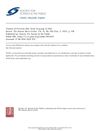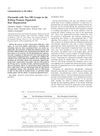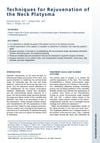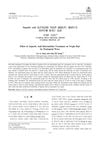
Sensory neurons and Merkel cells remodel at different rates during normal skin maintenance.

Sensory neuron and Merkel cell changes in the skin happen independently during normal skin maintenance.
33 citations,
May 2016 in “Translational andrology and urology” Laser hair removal before genital surgery can prevent complications and improve patient satisfaction.
 61 citations,
June 2018 in “Proceedings of the National Academy of Sciences of the United States of America”
61 citations,
June 2018 in “Proceedings of the National Academy of Sciences of the United States of America” Light can turn on hair growth cells through a nerve path starting in the eyes.
148 citations,
October 2008 in “The journal of investigative dermatology/Journal of investigative dermatology” Mice without the vitamin D receptor are more prone to UV-induced skin tumors.
 27 citations,
July 2008 in “Neuroscience”
27 citations,
July 2008 in “Neuroscience” Finasteride given to baby rats causes anxiety-like behavior and worsens learning from punishment in adult rats.
 18 citations,
June 2019 in “Clinical research in dermatology”
18 citations,
June 2019 in “Clinical research in dermatology” Acne can't be cured but can be managed with treatments like benzoyl peroxide and diet changes; it's costly and can lead to scarring and mental health issues.
 5 citations,
September 2018 in “Bioscience, Biotechnology, and Biochemistry”
5 citations,
September 2018 in “Bioscience, Biotechnology, and Biochemistry” Thiosulfate may help hair grow faster in mice and works well with a common hair growth treatment.
 June 1937 in “Science news-letter/Science news letter”
June 1937 in “Science news-letter/Science news letter” Vitamin B can prevent hair from turning gray in rats.
 January 2024 in “Biochemistry Research International”
January 2024 in “Biochemistry Research International” Compounds from Ziziphus spina-christi roots show strong antibacterial and antioxidant potential.
 7 citations,
March 2020 in “Lasers in Medical Science”
7 citations,
March 2020 in “Lasers in Medical Science” LLLT is a safe, promising hair loss treatment, but more research needed.
 13 citations,
November 2021 in “Biomedicines”
13 citations,
November 2021 in “Biomedicines” Plasma-activated liquid can kill harmful cells, speed up wound healing, and potentially treat cancer without damaging healthy cells.
 13 citations,
August 2019 in “Biological & Pharmaceutical Bulletin”
13 citations,
August 2019 in “Biological & Pharmaceutical Bulletin” Certain flavonoids help grow back colored hair after skin injury.
 12 citations,
April 2014 in “Facial Plastic Surgery Clinics of North America”
12 citations,
April 2014 in “Facial Plastic Surgery Clinics of North America” Direct excision techniques can rejuvenate the neck but may not enhance the jawline and could cause neck-face disharmony if done incorrectly.
 April 2024 in “Bioactive materials”
April 2024 in “Bioactive materials” New microneedle treatment with growth factors and a hair loss drug shows better and faster hair growth results than current treatments.
 7 citations,
February 2018 in “International Journal of Pharmaceutics”
7 citations,
February 2018 in “International Journal of Pharmaceutics” Researchers developed a method to measure drugs in hair follicles and found that both water-loving and fat-loving drugs can be detected after being applied to the skin.
 13 citations,
January 2021 in “Scientific Reports”
13 citations,
January 2021 in “Scientific Reports” Pannexin 3 helps skin and hair growth by controlling a protein called Epiprofin.
30 citations,
October 2010 in “Biochemical and biophysical research communications” The Gsdma3 gene is essential for normal hair development in mice.
1 citations,
October 2023 in “Animals” A small dose of Platycladus orientalis leaf extract improves raccoon dogs' growth and health, but higher doses can be harmful.
 1 citations,
April 2021 in “Han'gug miyong haghoeji/Journal of the Korean society of cosmetology”
1 citations,
April 2021 in “Han'gug miyong haghoeji/Journal of the Korean society of cosmetology” Aspartic acid at 0.75% makes perms more effective and less damaging to hair.
22 citations,
March 2017 in “Journal of the Formosan Medical Association” The guidelines help doctors manage skin problems from certain cancer treatments to improve patients' lives.
 9 citations,
June 2022 in “Reviews in Environmental Science and Bio/Technology”
9 citations,
June 2022 in “Reviews in Environmental Science and Bio/Technology” Maritime pine bark has various chemical components useful for different industrial uses.
April 2024 in “Cosmetics” Microneedling improves skin and hair conditions by enhancing treatment absorption and stimulating growth factors.
 2 citations,
August 2016 in “Química Nova”
2 citations,
August 2016 in “Química Nova” Using iontophoresis on minoxidil sulphate-loaded chitosan nanoparticles increases drug release but reduces its targeting to hair follicles.
 1 citations,
March 2018 in “Cureus”
1 citations,
March 2018 in “Cureus” Scrotal rejuvenation treats aging-related changes in men's scrotum using methods like medication, hair transplantation, and surgery.
 18 citations,
September 2013 in “Technology”
18 citations,
September 2013 in “Technology” The study introduced a new imaging technology to track skin healing and bone marrow cell activity over time.
7 citations,
December 2021 in “Pharmaceutics” The nanoemulsion with garlic oil, apple cider vinegar, and minoxidil could effectively treat alopecia areata.
 January 2018 in “Springer eBooks”
January 2018 in “Springer eBooks” Different races and genders have unique skin and hair issues, requiring specialized care and more research for effective treatment.
 11 citations,
January 2013 in “Methods in molecular biology”
11 citations,
January 2013 in “Methods in molecular biology” The method allows for 3D tracking of hair follicle stem cells and shows they can regenerate hair for up to 180 days.
 7 citations,
January 2019 in “Brazilian Journal of Pharmaceutical Sciences”
7 citations,
January 2019 in “Brazilian Journal of Pharmaceutical Sciences” Maidenhair fern extract reduced anxiety and depression in rats and may work due to its antioxidant and anti-inflammatory properties.























